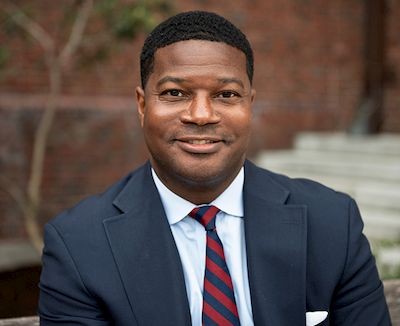Blessed Are the Rich: The American Gospel of Success

19th Annual Prophetic Voices Lecture
Jonathan Lee Walton
Wake Forest University
Date: Postponed
Abstract
The idea that God wants us all to be wealthy and prosper dates back to the founding of the nation. Puritans, mainline Protestants, and charismatic Pentecostals alike have claimed divine right to name prestige, privilege, and prosperity as their own. Nor is it limited to formally organized religious spaces and ordained clergy. Prominent cultural figures like Benjamin Franklin, Bruce Barton, and Oprah Winfrey have proven to be premier revivalists of this quintessentially American gospel. Prosperity is a prominent feature of the prevailing creed of this nation. What role can communities of faith have in challenging the very tenets that make its institutional existence possible? Or is the Christian Church in the United States damned to irrelevancy as a result of its own “success”?
Speaker Bio

Jonathan L. Walton is a social ethicist whose scholarship focuses on evangelical Christianity, and its relationship to mass media and political culture. He is an outspoken advocate for social justice and civil rights. His work and insights have been featured in several national and international news outlets including the New York Times, CNN, Time Magazine, and the BBC.
His latest book, A Lens of Love: Reading the Bible in Its World for Our World (Westminster John Knox Press, 2018), blends his work from the pulpit and classroom. A Lens of Love explores the Bible from the perspective of the most vulnerable and violated characters toward developing a Christian social ethic of radical inclusion and human affirmation.
Walton earned his Doctor of Philosophy and Master of Divinity degrees from Princeton Theological Seminary. He served as the Plummer Professor of Christian Morals and Pusey Minister in the Memorial Church at Harvard University prior to being appointed Dean of the Divinity School and Wait Chapel at Wake Forest University in 2019. Walton also occupies the Presidential Chair in Religion & Society at Wake Forest.
He is married to the former Cecily Cline, and they are the parents of three children—Zora Neale, Elijah Mays, and Baldwin Cline.
Read More
Books
Bowler, Kate. Everything Happens for a Reason: And Other Lies I’ve Loved. New York: Random House, 2018.
Heuser, Andreas. Pastures of Plenty: Tracing Religio-Scapes of Prosperity Gospel in Africa and Beyond. New York: Peter Land Edition, 2015.
Sinitiere, Philip Luke. Salvation with a Smile: Joel Osteen, Lakewood Church, and American Christianity. New York: New York University Press, 2015.
Walton, Jonathan L. A Lens of Love: Reading the Bible in Its World for Our World. Louisville: Westminster John Knox Press, 2018.
Yong, Amos and Katy Attanasi. Pentecostalism and Prosperity: The Socio-Economics of the Global Charismatic Movement. New York: Palgrave Macmillan, 2012.
Articles
Bowler, Kate and Reagan Wen. “Bigger, Better, Louder: The Prosperity Gospel’s Impact on Contemporary Christian Worship.” Religion and American Culture: A Journal of Interpretation 24, no. 2 (2014): 186-230. DOI: 10.1525/rac.2014.24.2.186
Brown, Charles. “Selling Faith: Marketing Christian Popular Culture to Christian and Non-Christian Audiences.” Journal of Religion and Popular Culture 24, no. 1 (Spring 2012): 113.
Hladky, Kathleen. “I Double-Dog Dare You in Jesus’ Name! Claiming Christian Wealth and the American Prosperity Gospel.” Religion Compass 6, no. 1 (January 2012): 82-96. DOI: 10.1111/j.1749-8171.2011.00325.x
Mundey, Peter. “The Prosperity Gospel and the Spirit of Consumerism According to Joel Osteen.” PNUEMA 39, no. 3 (2017): 318-341. DOI: 10.1163/15700747-03903018
In the News
Recently, the National Catholic Reporter released a three-part series about Matthew Kelly--a well-known Catholic writer, speaker, and businessperson. The series focuses on Kelley’s conflicts of interest between his non-profit organization and several of his for-profit companies. Often been considered the Catholic equivalent of the prosperity gospel proponent and evangelical Protestant pastor, Joel Osteen, they together raise questions about the relation between Christianity and business but most importantly about the messages that they send to society at large: does God only favor those with wealth and success?

